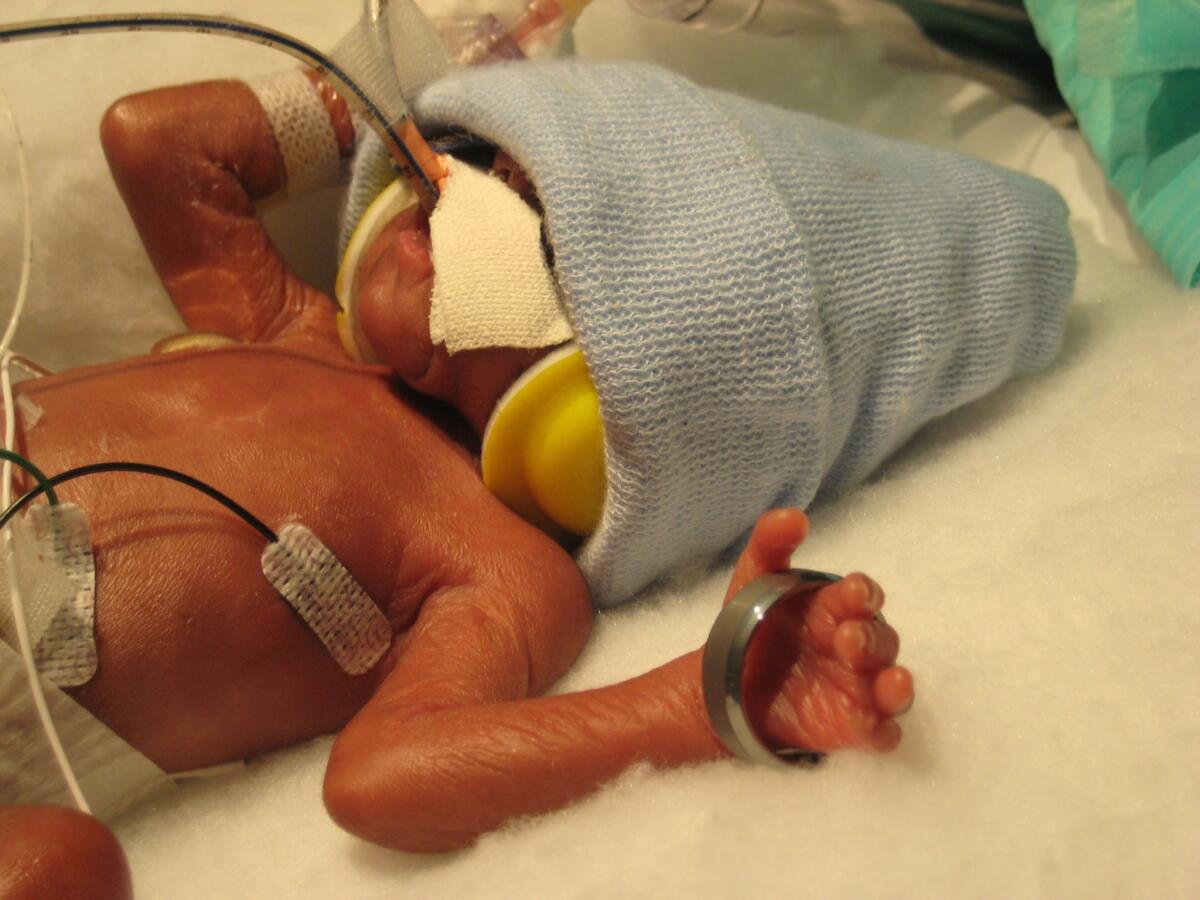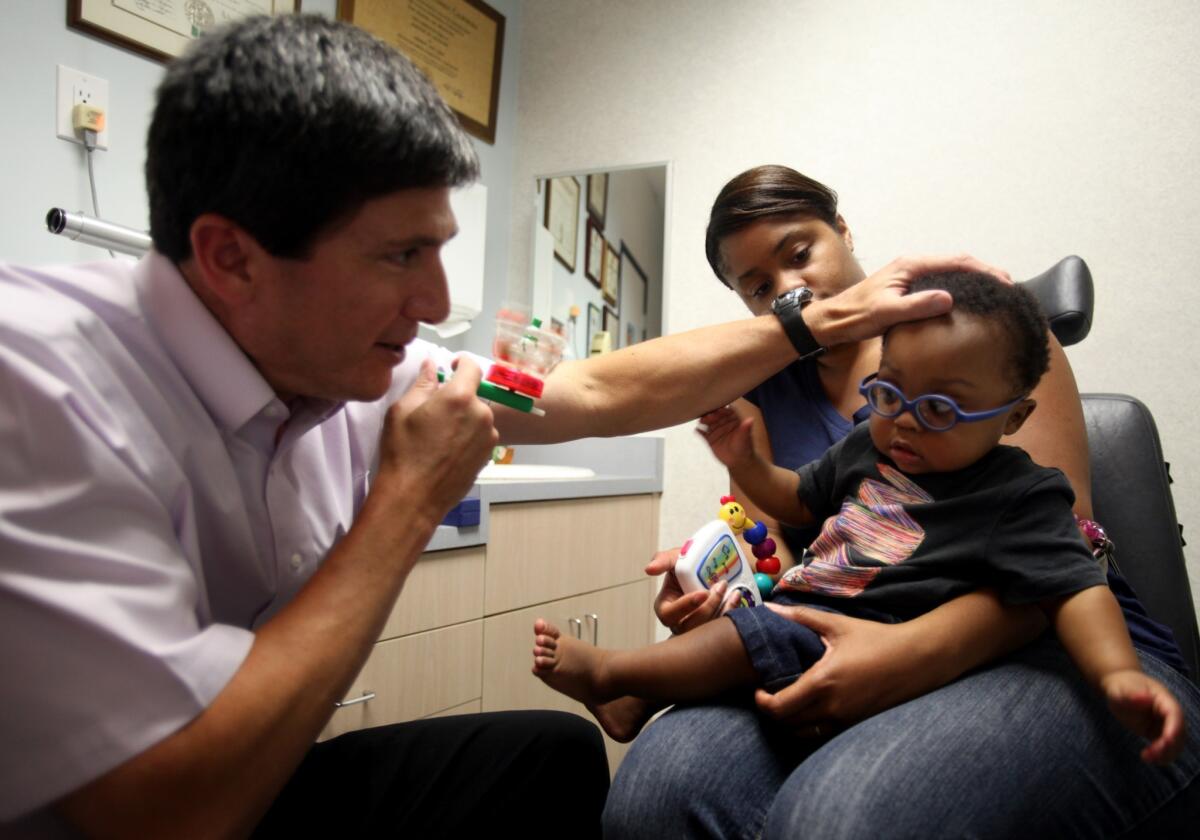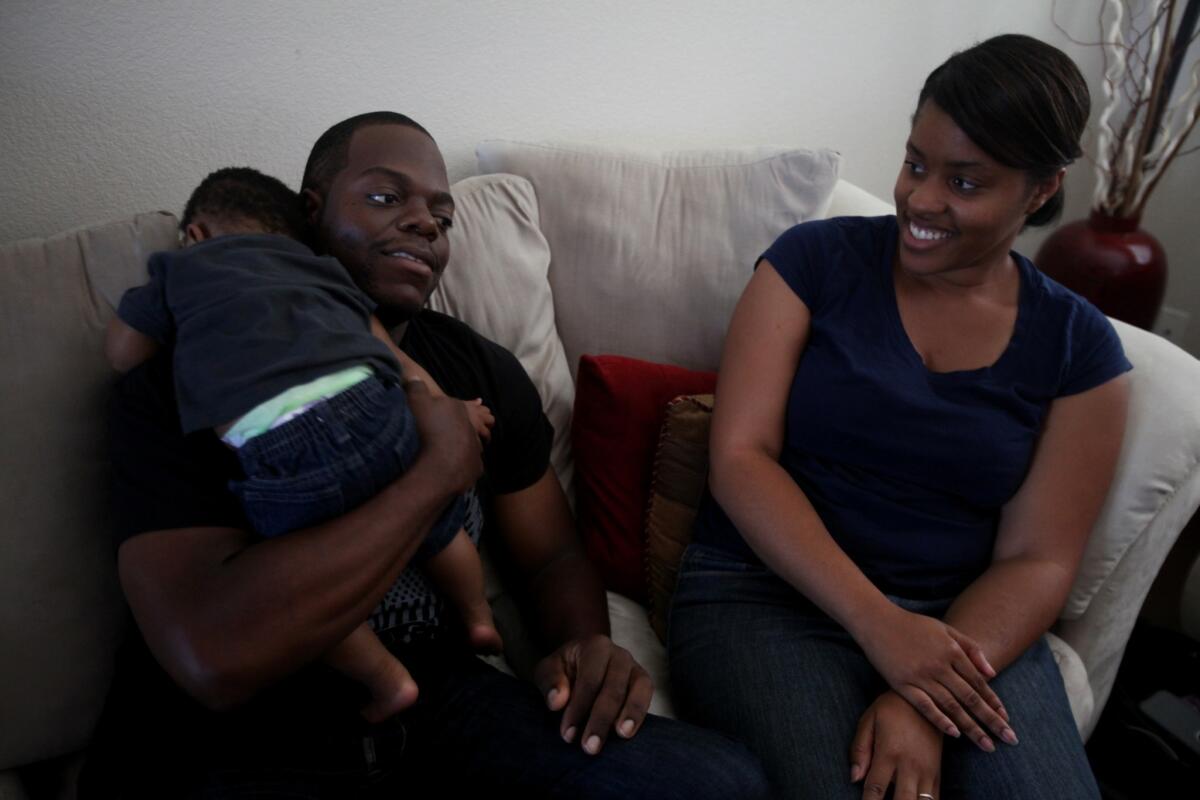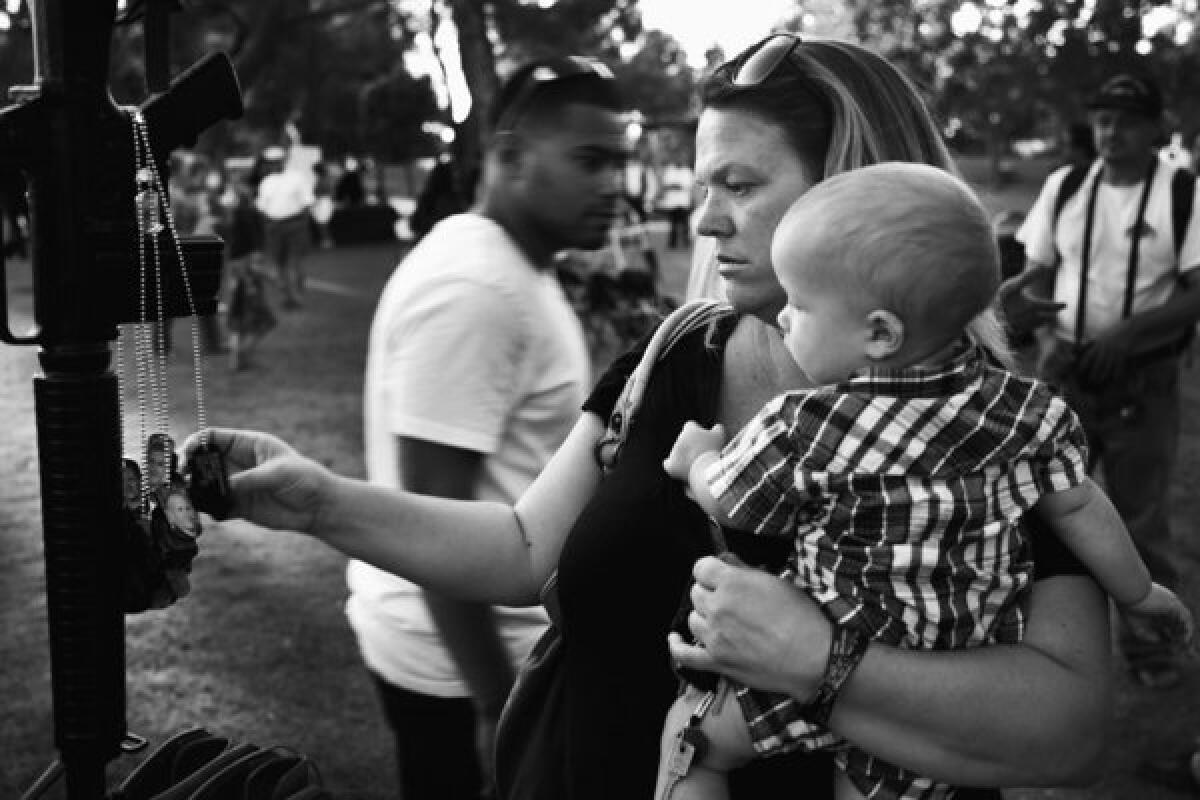For black infants, a precarious start in life
Black babies are more than twice as likely as white ones to die before their first birthday. The healthcare overhaul might help.
The cramping came on quickly. Then the bleeding.
Samantha Bradley was only six months pregnant. She had already miscarried once. She knew she needed to get to an emergency room.
"I was in tears," she said. "The only thing I could think was 'Get me to a hospital.'"
On vacation in Palm Springs, Bradley and her sister rushed to a nearby hospital. About 30 minutes later, Bradley gave birth to her son.
The baby weighed just 1 pound, 8 ounces â a little more than a bag of coffee.
She got only a quick glance before doctors whisked him away. She saw his rib cage protruding from his tiny frame. He didn't make a sound.

Black women like Bradley are 1 1/2 times as likely as white women to give birth prematurely, and their babies are more than twice as likely to die before their first birthday.
Researchers once blamed a lack of prenatal care for the disparity. Now, research shows that the explanation is much more complex, rooted in the years before the women even get pregnant. Black women are more likely to be poor, have less education, lack health insurance and have chronic conditions such as diabetes and obesity.
By the time they see a doctor, seven months is too short to repair long-term adverse health."â Kay Johnson, U.S. Health and Human Services Department
"They are coming into the pregnancy at higher risk," said Kay Johnson, who chairs the advisory committee on infant mortality for the U.S. Health and Human Services Department. "By the time they see a doctor, seven months is too short to repair long-term adverse health."
The leading causes of infant mortality are preterm birth and low birth weight. Even if premature children survive, they can face lifelong health or developmental problems.
The nation's healthcare overhaul is expected to help close the racial gaps by increasing access to preventive care, health insurance and family planning, Johnson said. The government is also investing in projects to reduce preterm birth and infant mortality.
Programs in Los Angeles County, including L.A. Best Babies Network and Great Beginnings for Black Babies, take steps such as screening women for depression and substance abuse and helping get them into stable housing and out of abusive relationships, often before they get pregnant.
"While there are all these medical risk factors, there are a whole bunch of other social risks," said Erin Saleeby, director of women's health programs for the county Department of Health Services. "The medical side of it will never be enough."

Samantha and Antoine Bradley met during a summer program for college-bound high school students. She went on to graduate from Cal State Dominguez Hills and started working with homeless people on skid row. He got a job cleaning up hazardous materials. They married in 2010.

Adris was so tiny when he was born that one hand fit in his parents' wedding band. (Family photo) More photos
Both had a rough start in life. Antoine had been born prematurely. Samantha Bradley's biological mother used drugs, so Bradley had been placed in foster care and later adopted. Both want a big family.
Three months into her first pregnancy, Bradley, who is now 27, miscarried. The loss was overwhelming. Getting pregnant again less than a year later made her excited but nervous. She attended her prenatal appointments diligently, and doctors assured her the pregnancy was going well. They decided to name the baby Adris.
Every time she heard the heartbeat in her belly, Bradley felt relieved. But on the day her son was born, she just felt scared.
He lay in an incubator, seemingly tangled in a web of tubes and cords. To lessen the environmental stimulation, his eyes and ears were covered. Machines helped him breathe. His skin was translucent, clearly showing his miniature veins.
Bradley wanted a doctor to tell her that Adris would be fine. No one would.
"It took trust and belief in God that everything was going to be OK," she said.
She wanted to hold him, to kiss him and to breast-feed him. Antoine, 28, hated that he couldn't see his son's eyes: "I just wanted to see him with his eyes open looking at Mommy and Daddy."

Socioeconomics and medical care don't fully explain why black women disproportionately lose their babies. Even black women who are highly educated are at higher risk than white women with less education.
That may be because of the cumulative effects of racism and stress, said Johnson, citing research on the subject.

Baby Adris looks a bit skeptical as Dr. Robert Clark examines him in preparation for surgery. More photos
Meridith Merchant, 42, a licensed psychologist who lives in Los Angeles, said she did everything she was supposed to do during her pregnancy in 2005, including eating well and attending all her prenatal appointments. She planned to have a home birth with the help of a midwife.
When she was 6 1/2 months pregnant, her water broke. She called the midwife, who told her to go to the hospital. She had been at Cedars-Sinai Medical Center for about a week when she gave birth to a girl, Nailah Asha, who weighed just 2 pounds.
Nailah spent five months in the neonatal intensive care unit, until she could eat and breathe on her own. Looking at Nailah lying in the incubator, Merchant thought, "She's still baking.'"
Merchant and her husband spent long hours at the hospital. Nailah had been born with heart defects, and several weeks after her birth, she tested positive for Down syndrome.
She went home after five months but still had trouble gaining weight. One afternoon, Merchant was holding Nailah when her body went limp. Merchant called 911. Her daughter died at the hospital of an intestinal disorder. It was one day before her first birthday.
Every year, Merchant said, she commemorates Nailah's birthday.

About a week after Adris' birth, he had surgery to close a valve near his heart. When he was 2 months old, he needed eye surgery because of a disease common among premature infants. After the second surgery, he got an infection, and what was supposed to be a short visit turned into a monthlong stay.
Finally, when he was 4 months old, Adris went home.
The Bradleys decorated his room, hanging wood letters that spelled Adris above his crib and putting favorite children's books on a shelf â "The Very Hungry Caterpillar," "Pat the Bunny," "Goodnight Moon."
The weeks passed in a blur of medical appointments, with a neurologist, an eye doctor, a heart doctor and a pediatrician. Adris got his first cold around Christmas and had to go to the emergency room because his lungs were so weak. Samantha Bradley worried about him getting the next one and whether it would be worse.

Antoine Bradley, 28, wife Samantha, 27, and baby Adris hang out in their Long Beach home. Now that Adris has passed his first birthday, Samantha said she has started to look forward to the future and stop worrying so much about what could happen. "He made it," she said. More photos
But little by little, Adris started to grow and become more healthy.
On July 12, the Bradleys finally reached the day they had dreamed of â Adris' first birthday. Family and friends gathered at a park, ate cupcakes and sang "Happy Birthday." Samantha Bradley put up a clothesline and hung pictures of her son, showing his growth during his first year.
Bradley said that was the day she started to look forward to the future and stop worrying so much about what could happen. "He made it," she said.
Adris still has eye problems and wears blue plastic glasses several hours a day. Last month, a few days before he was scheduled for another surgery, his mother took him to the eye doctor.
The doctor told her the operation wasn't dangerous, especially compared with everything Adris had been through the last year. "OK, buddy, you do a good job, OK?" he said. Then he turned to Bradley. "We'll take good care of him. He's such a hardy boy."
The surgery, three days later, went off without a hitch. Adris went home the same day.
Bradley still feels anxious about her son's future â and about her plans for a big family. But most days, she just focuses on being a mother.
Adris crawls around the living room, grabbing toys to chew on and playing with the buttons on the television. The other day he said his first word: Mama.
On a recent afternoon, he wrapped his arms around his mother. "Thank you for this wonderful hug," she said, squeezing him back.
Follow Anna Gorman (@annagorman) on Twitter
Sign up for Essential California
The most important California stories and recommendations in your inbox every morning.
You may occasionally receive promotional content from the Los Angeles Times.









